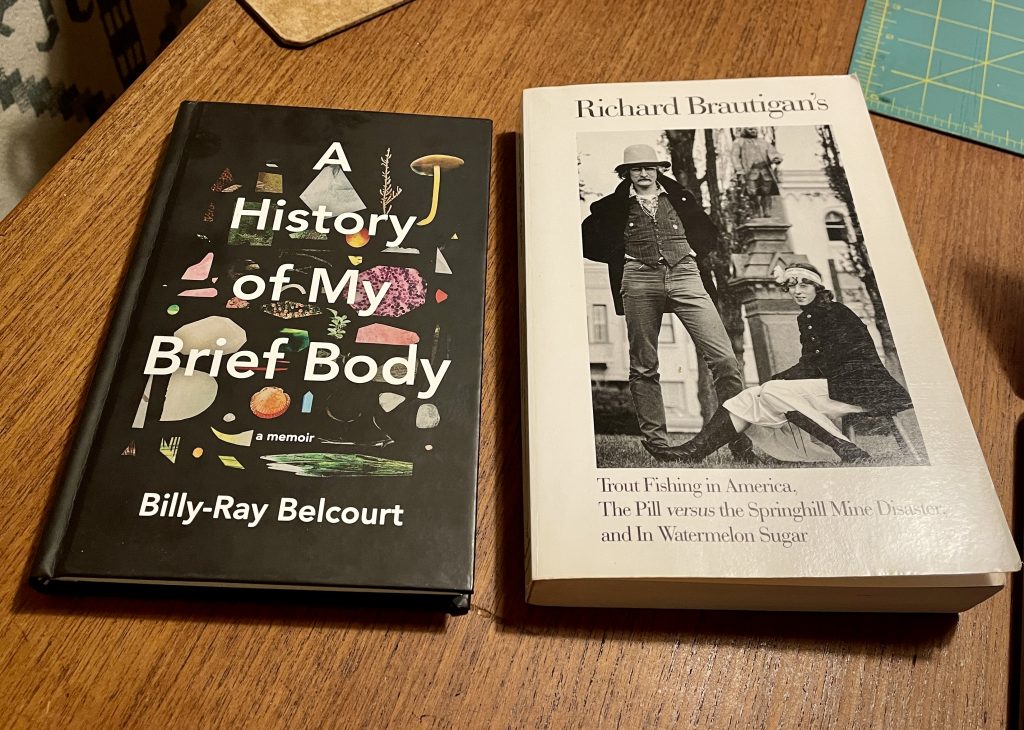
Rather than rummaging through my memory of (many) recent viewings, I searched my recollection for media that elicited profound affect, and landed on Billy-Ray Belcourt’s (2020) novel, A History of My Brief Body. Belcourt’s writing is a multilayered collage of short stories, autobiographical prose, poetry, narrative, and societal critique. His storytelling is juxtaposed with a sharp criticism of colonial Canada, interspersed with references to media such as film, literature, and critical theory. Throughout A History of My Brief Body, Belcourt, a young queer Indigenous writer from the Driftpile Cree Nation (Belcourt, n.d.) located in northern Alberta, explores his identity through the intersections of queerness and Indigeneity. The complexity of A History of My Brief Body’s form is reflective of intersectionality as, ‘a multifaceted perspective acknowledging the richness of the multiple socially-constructed identities that combine to create us as a unique individual” (Lind, as cited in Hill Collins & Bilge, 2016, p. 89).
A History of My Brief Body shares Tuck and Gaztambide-Fernández’s (2013) refusal to comply with settlers’ desire to quiet their anxiety (p. 86), or “comfort their dis-ease” (p. 86). Settlers in Canada are warned of the discomfort of reconciliation, and Belcourt unapologetically provokes the necessary kind of discomfort that is often missing in corporate and academic Truth and Reconciliation initiatives. He writes, “I wonder: How will we ever look white people in the eyes and not periodically see our mangled bodies? This isn’t hyperbole. We have Canadian citizenship, of course, and as citizens we will remember how to participate in the world, but we are still the hunted” (2020, p. 155). Belcourt’s uncensored narratives of being Indigenous and queer in Canada are explicitly written and reveal a vulnerability, “to be queer and NDN is paradoxical in that one is born into a past to which he is also unintelligible. I wasn’t born to love myself every day” (p. 28).
Trout Fishing in America by Richard Brautigan (1989), first published in 1967 is similar in form to A History of My Brief Body – it is a series of short stories and poetry woven together. It is difficult to describe exactly what “Trout Fishing in America” is – it is often presented as different characters, or as an event, or as an undefined descriptor; its repeated usage evokes a humourous absurdity. As with Belcourt, Brautigan’s writing reveals the intimate innerworkings of the writer’s mind, but Brautigan’s content is playful, naïve and untethered to reality.
Although occasionally revealing nuances of current society, Brautigan’s writing does not display intersectionality or an intersectional understanding of self. Brautigan, a white male living and writing as a beat poet and ‘hippy’ in the 50s and 60s (Poetry Foundation, 2023), likely did not possess a self-awareness informed by “interlocking systems of oppression” (Razack as cited in Jeppesen and Petrick, 2018, p. 15) as his position in society did not subject him to significant oppression.
References:
Belcourt, B. R. (2020). A history of my brief body. Penguin Random House.
Belcourt, B. R. (n.d.). About Me. Billy-Ray Belcourt. https://billy-raybelcourt.com/
Brautigan, R. (1989). Richard Brautigan’s Trout fishing in America; The pill versus the Springhill mine disaster; and, In watermelon sugar. Houghton Mifflin Harcourt.
Hill, C. P. & Bilge, S. (2016). Intersectionality. Polity.
Jeppesen, S., & Petrick, K. (2018). Toward an intersectional political economy of autonomous media resources. Interface: A Journal for and About Social Movements, 10(1-2), 8-37.
Poetry Foundation (2023). Richard Brautigan 1935–1984. Poetry Foundation. https://www.poetryfoundation.org/poets/richard-brautigan
Tuck, E., & Gaztambide-Fernández, R. A. (2013). Curriculum, replacement, and settler futurity. Journal of curriculum theorizing, 29(1).
